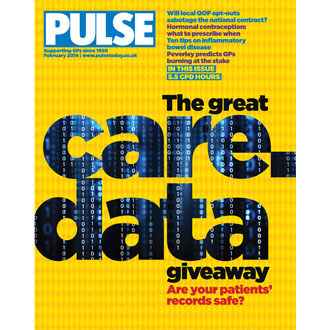The Government has decided to axe its flagship care.data GP-record sharing scheme, more than two years after it was shelved at the last minute.
Life science minister George Freeman said in a statement that ‘NHS England has taken the decision to close the care.data programme’.
But he added that the Government remained ‘absolutely committed’ to ‘the benefits of sharing information’ to improve patient outcomes’, but that this had to be done in ‘close collaboration’ with GPs.
The announcement follows the publication of National Data Guardian Dame Fiona Caldicott’s long-awaited report on NHS patient data security this morning.
The care.data scheme to link up information from GP patient records and hospitals and share these data more widely was pulled on 18 February 2014, just days before it was due to go live in March.
A series of concerns were raised by GPs and patient groups about the use of patient data and the ‘opt-out’ model used for the project. Pulse had warned that GPs, as patient data controller, could become liable if patients complained. National media also picked up on Pulse’s revelation that NHS England threatened an Oxford GP with a breach of contact notice after he said he would automatically opt out his entire patient list from the scheme and that over 40% of GPs would opt themselves out of the scheme.
In the wake of the controversy, the Government commissioned a full review of consent models and data security in the NHS, which was published today by Dame Fiona.
Mr Freeman said: ‘In light of Dame Fiona’s recommendations, NHS England has taken the decision to close the care.data programme. However, the Government and the health and care system remain absolutely committed to realising the benefits of sharing information, as an essential part of improving outcomes for patients.
‘Therefore this work will now be taken forward by the National Information Board, in close collaboration with the primary care community, in order to retain public confidence and to drive better care for patients.’
GPC chair Dr Richard Vautrey told Pulse: ‘GPC nationally and LMCs locally repeatedly raised serious concerns about the care.data programme and we have clearly been proved right to have done this. Any future arrangements for data sharing must be developed with the profession from the outset.’
Today’s report from Dame Fiona has recommended ten new data protection standards that GP practices would have to abide by, and CQC released its own plans for how it would include checks against these in GP practice inspections.
The Government has this afternoon published a public consultation into the new recommended standards.
Big data’s downfall

Feb 2014 issue cover
NHS England shelved its flagship GP record sharing scheme, care.data in February 2014 after a taxpayer-funded £2m publicity campaign that had come under fire for being unclear and only seen by one third of households.
Care.data was intended to extract the clinical contents of the GP record, along with partially anonymised information including age, gender and a partial postcode. This was to be uploaded to the Health and Social Care Information Centre (HSCIC) and linked up with information held about the patient in other parts of the NHS, it could then be used for research and commissioning purposes.
But the scheme also included plans to sell data – for a small cost-recovery fee – to researchers, charities and private organisations, which attracted a lot of concern from GPs and privacy campaigners as it was run on an ‘assumed consent’ model.
After the furore, NHS England began runnning ‘pathfinder’ pilots in four parts of the country to test different ways of rolling out the scheme, but these have now been scrapped after Dame Fiona’s review.
However, the Government says it remains ‘absolutely committed’ to ‘the benefits of sharing information’ to improve patient outcomes’ so care.data may be dead, but the idea is still alive.
Pulse October survey
Take our July 2025 survey to potentially win £1.000 worth of tokens














